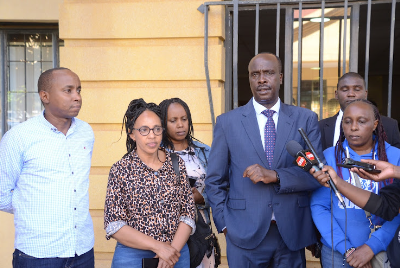The Court of Appeal has ordered that the body of Silas Igweta be preserved at Umash Funeral Home in Nairobi pending the resolution of a case filed by his second wife, Sarah Kathambi. Kathambi and her co-wife, Grace Rigiri, are in a dispute over who should be responsible for burying their husband.
Igweta passed away in Nairobi on February 17 at the age of 100. He was living with his second wife, Kathambi, at the time of his death. As Kathambi and her children, Purity Kinya and Miriam Makena, were making burial arrangements, Rigiri and her son, Mathew Kobia, went to court seeking orders for the release of the body for burial.
The two women live in Kianjai (Rigiri) and Lairangi Mumui (Kathambi), which are approximately 40 kilometers apart within Tigania West Constituency in Meru County.
In April, Milimani family court chief magistrate G.M. Gitonga ruled that Igweta should be buried at the home of his second wife, noting that the second family had established a close familial bond with him. The magistrate also determined that it was Igweta’s wish to be buried in Lairangi Mumui.
However, Rigiri challenged that decision in the High Court, where Justice Stephen Riechi ruled on May 21 that Igweta’s body should be released to his first wife for burial at Kianjai, in accordance with Ameru traditions and customs.
An aggrieved Kathambi then appealed to the Court of Appeal, seeking a stay of the High Court’s judgment. Kathambi and her children argued that the High Court judge made an error by limiting the issues for determination and considering matters not presented in the trial court.
They maintained that they had won the case in magistrate court due to the close familial bond they had established with Igweta before his death and the fact that he had abandoned his Kianjai farm for 40 years prior to his passing. Additionally, they argued that the judge overlooked Igweta’s wish to be buried in Lairangi Mumui, not Kianjai, which he had long since left behind.
In a ruling dated July 26, Court of Appeal judges Gatembu Kairu, Lydia Achode, and Grace Ngenye-Macharia acknowledged that the case involves a highly emotional burial dispute between two wives and their families, both asserting their rights to bury the deceased on their chosen land.
In her appeal, Kathambi argued that stay orders were essential to prevent the need to exhume Igweta’s body should her appeal succeed. The judges concurred with this reasoning, stating that if the requested orders are not granted and the appeal is successful, it would render the situation meaningless.
“Enforcement of the orders post-interment would entail exhumation and relocation of the remains of the deceased. This would not only be costly but would also subject the family to unnecessary hardship and indignity,” the judges ruled.
They concluded the appeal has merit and directed that the interment of the deceased be stayed pending the hearing and determination of the main appeal.
“We are of the view that the grounds raised in the memorandum of appeal are not idle and ought to be given a chance to be ventilated,” the judges said in their ruling.



